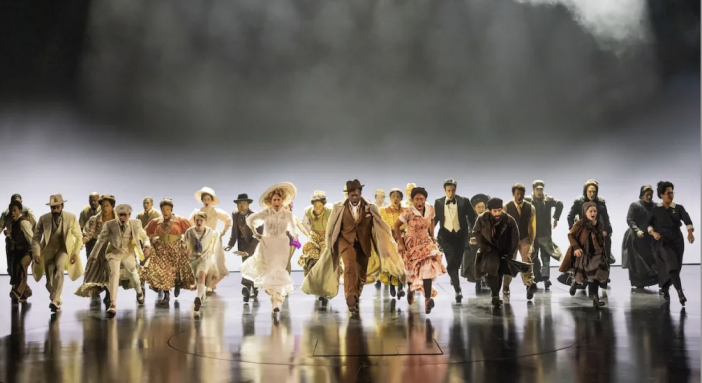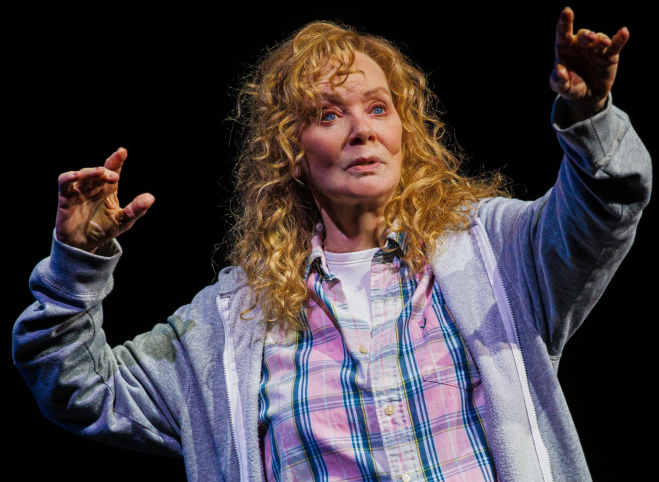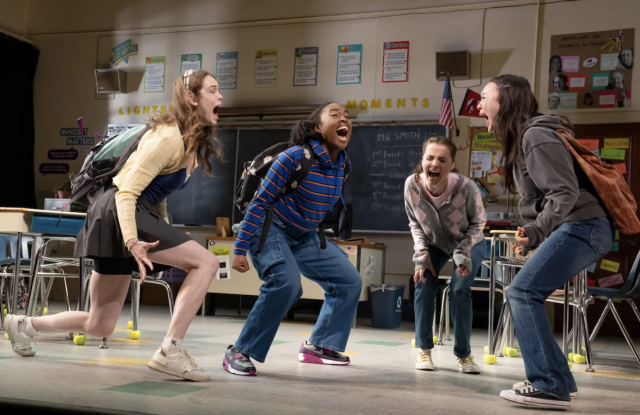
Joshua Henry, Caissie Levy, Brandon Uranowitz lead the 48-actor cast. (Photo: Michael Murphy)
Ragtime
By Fern Siegel
At the turn of the 20th century, America grappled with its identity. Immigration, race, class and cries for social justice were challenging its promise as a refuge where all could succeed. That epic story is beautifully told in the musical Ragtime, based on E.L. Doctorow’s extraordinary novel about three families pursuing the American Dream.
Now at Lincoln Center, the latest revival of Ragtime, directed with flair by Lear DeBessonet, is neatly timed. As the U.S. deals with assaults on the very themes the musical addresses, Stephen Flaherty’s sweeping score, Lynn Ahrens’ spot-on lyrics and Terrence McNally’s moving book remind us how dynamic and troubled our history can be.
It’s that push-pull between the Jewish immigrant (“America is our home now, America is our shtetl”), Black characters’ desire to rise, and the determination of powerful white men (J.P. Morgan, Henry Ford) to maintain traditional power structures that makes Ragtime so compelling. In that space between possibility and prejudice, drama is born. The musical exists on several planes: history lesson, social commentary and engaging entertainment.
This incarnation is luminous — an all-star cast, gorgeous lighting and economic but evocative set design staged in an ideal venue.
The production opens in 1906 with three distinct units: an affluent family in New Rochelle, represented by Mother (Caissie Levy), Coalhouse Walker Jr., a Harlem musician (Joshua Henry), and Tateh, a Jewish immigrant from Latvia (a passionate standout Brandon Uranowitz), who arrives with his young daughter. Each gets a chance to tell their stories, though cutting one of Coalhouse’s numbers, given Henry’s strong performance, would not go amiss. We get the point about his strength and his lover Sarah’s (Nichelle Lewis) fate.
It would also help to better flesh out Mother’s burgeoning proto-feminism, which, in a world where women were dependent on their husbands (Colin Donnell) and could not vote, her quiet defiance is all the more impressive. Levy conveys volumes through visual expressions and bearing. And the lyric “We can never go back to before” resonates in her golden voice.

The Ensemble (Photo: Matthew Murphy)
What’s compelling is how the three singular and emotional stories play out: Sarah is taken to Mother’s home, Tateh makes his way from the poverty of Lower East Side streets, while Coalhouse seeks justice. Even as they struggle for recognition, the real-life figures of Emma Goldman (Shaina Taub), Evelyn Nesbit (Anna Grace Barlow), Harry Houdini (Rodd Cyrus) and Booker T. Washington (John Clay III) add key insights.
Anarchist Goldman fights against the ravages of capitalism that creates sweatshops, while Houdini, the Hungarian Jewish immigrant (real name Erik Weisz) celebrates escaping restraints, a metaphor if ever there was one.
It’s a mammoth effort to interweave colliding and distinct plot lines, as well as real and fictional characters. The result is a mosaic that in historic brushstrokes tells an intriguing story of a country’s potential — and its failure to deliver such high ideals. To DeBessonet’s credit, the pace is as lively as the ragtime-infused score, even as McNally reveals the suffering endured by many in pursuit of those goals.
Ragtime originally debuted in 1998 and has been revived several times. It compresses turn-of-the-century figures and moments in a clever way. And it’s worth reading Doctorow’s novel to appreciate how well-crafted his premise is. The Lincoln Center production is aided by David Korins’ sets, Linda Cho’s period-perfect costumes, Adam Honoré and Donald Holder’s exquisite lighting, Ellenore Scott’s lively choreography and Kai Harada’s effective sound.
But it’s the timing of the musical — and its Encores! run in 2024 — that makes the show so vital to remount. The score is soaring — Ragtime’s ethos is eternal.
At the Vivian Beaumont Theatre
150 W. 65th St.
Running time: 2 hours, 45 minutes, one intermission
Tickets: lct.org/shows/ragtime/
Through January 4, 2026




